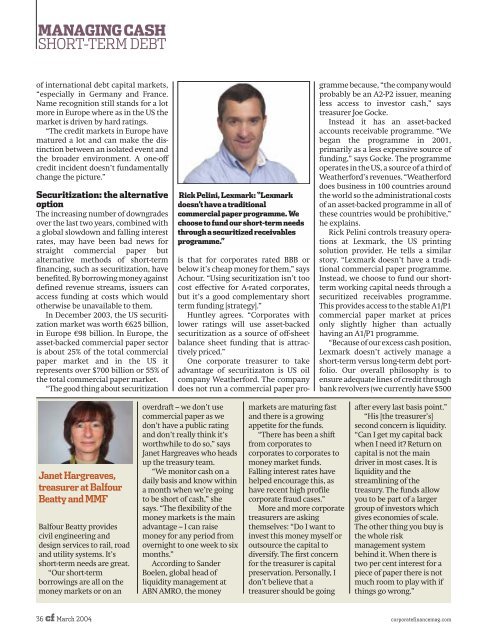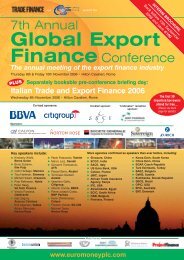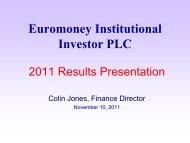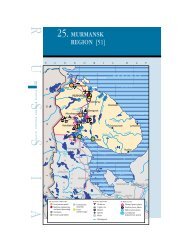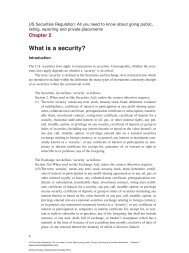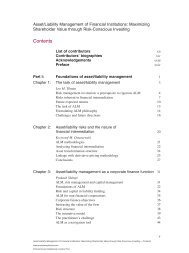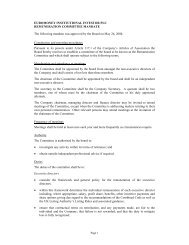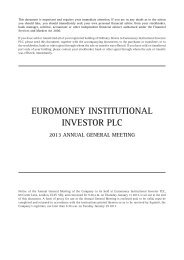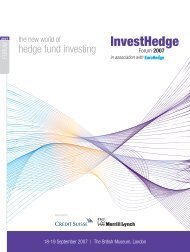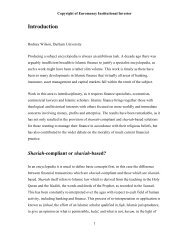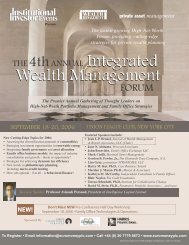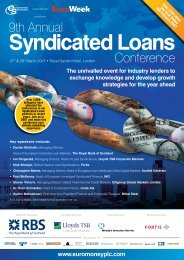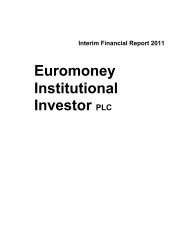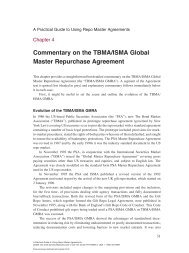something to smile about? - Euromoney Institutional Investor PLC
something to smile about? - Euromoney Institutional Investor PLC
something to smile about? - Euromoney Institutional Investor PLC
Create successful ePaper yourself
Turn your PDF publications into a flip-book with our unique Google optimized e-Paper software.
MANAGING CASHSHORT-TERM DEBTof international debt capital markets,“especially in Germany and France.Name recognition still stands for a lotmore in Europe where as in the US themarket is driven by hard ratings.“The credit markets in Europe havematured a lot and can make the distinctionbetween an isolated event andthe broader environment. A one-offcredit incident doesn’t fundamentallychange the picture.”Securitization: the alternativeoptionThe increasing number of downgradesover the last two years, combined witha global slowdown and falling interestrates, may have been bad news forstraight commercial paper butalternative methods of short-termfinancing, such as securitization, havebenefited. By borrowing money againstdefined revenue streams, issuers canaccess funding at costs which wouldotherwise be unavailable <strong>to</strong> them.In December 2003, the US securitizationmarket was worth €625 billion,in Europe €98 billion. In Europe, theasset-backed commercial paper sec<strong>to</strong>ris <strong>about</strong> 25% of the <strong>to</strong>tal commercialpaper market and in the US itrepresents over $700 billion or 55% ofthe <strong>to</strong>tal commercial paper market.“The good thing <strong>about</strong> securitizationRick Pelini, Lexmark: “Lexmarkdoesn’t have a traditionalcommercial paper programme. Wechoose <strong>to</strong> fund our short-term needsthrough a securitized receivablesprogramme.”is that for corporates rated BBB orbelow it’s cheap money for them,” saysAchour. “Using securitization isn’t <strong>to</strong>ocost effective for A-rated corporates,but it’s a good complementary shortterm funding [strategy].”Huntley agrees. “Corporates withlower ratings will use asset-backedsecuritization as a source of off-sheetbalance sheet funding that is attractivelypriced.”One corporate treasurer <strong>to</strong> takeadvantage of securitiza<strong>to</strong>n is US oilcompany Weatherford. The companydoes not run a commercial paper programmebecause, “the company wouldprobably be an A2-P2 issuer, meaningless access <strong>to</strong> inves<strong>to</strong>r cash,” saystreasurer Joe Gocke.Instead it has an asset-backedaccounts receivable programme. “Webegan the programme in 2001,primarily as a less expensive source offunding,” says Gocke. The programmeoperates in the US, a source of a third ofWeatherford’s revenues. “Weatherforddoes business in 100 countries aroundthe world so the administrational costsof an asset-backed programme in all ofthese countries would be prohibitive,”he explains.Rick Pelini controls treasury operationsat Lexmark, the US printingsolution provider. He tells a similars<strong>to</strong>ry. “Lexmark doesn’t have a traditionalcommercial paper programme.Instead, we choose <strong>to</strong> fund our shorttermworking capital needs through asecuritized receivables programme.This provides access <strong>to</strong> the stable A1/P1commercial paper market at pricesonly slightly higher than actuallyhaving an A1/P1 programme.“Because of our excess cash position,Lexmark doesn’t actively manage ashort-term versus long-term debt portfolio.Our overall philosophy is <strong>to</strong>ensure adequate lines of credit throughbank revolvers (we currently have $500Janet Hargreaves,treasurer at BalfourBeatty and MMFBalfour Beatty providescivil engineering anddesign services <strong>to</strong> rail, roadand utility systems. It’sshort-term needs are great.“Our short-termborrowings are all on themoney markets or on anoverdraft – we don’t usecommercial paper as wedon’t have a public ratingand don’t really think it’sworthwhile <strong>to</strong> do so,” saysJanet Hargreaves who headsup the treasury team.“We moni<strong>to</strong>r cash on adaily basis and know withina month when we’re going<strong>to</strong> be short of cash,” shesays. “The flexibility of themoney markets is the mainadvantage – I can raisemoney for any period fromovernight <strong>to</strong> one week <strong>to</strong> sixmonths.”According <strong>to</strong> SanderBoelen, global head ofliquidity management atABN AMRO, the moneymarkets are maturing fastand there is a growingappetite for the funds.“There has been a shiftfrom corporates <strong>to</strong>corporates <strong>to</strong> corporates <strong>to</strong>money market funds.Falling interest rates havehelped encourage this, ashave recent high profilecorporate fraud cases.”More and more corporatetreasurers are askingthemselves: “Do I want <strong>to</strong>invest this money myself oroutsource the capital <strong>to</strong>diversify. The first concernfor the treasurer is capitalpreservation. Personally, Idon’t believe that atreasurer should be goingafter every last basis point.”“His [the treasurer’s]second concern is liquidity.“Can I get my capital backwhen I need it? Return oncapital is not the maindriver in most cases. It isliquidity and thestreamlining of thetreasury. The funds allowyou <strong>to</strong> be part of a largergroup of inves<strong>to</strong>rs whichgives economies of scale.The other thing you buy isthe whole riskmanagement systembehind it. When there istwo per cent interest for apiece of paper there is notmuch room <strong>to</strong> play with ifthings go wrong.”36 cf March 2004 corporatefinancemag.com


